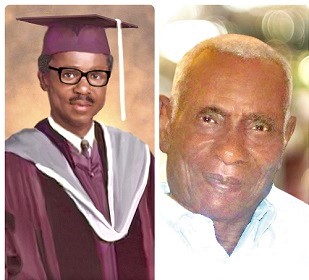
Reading for pleasure: Memories of W. C. Dwamena
A story Mr W.C. Dwamena told our Form 3 class at Mfantsipim in the early 1960s continues to guide my public speeches up to this day. He said, a man was a keynote speaker at a large glitzy event.
After he was introduced with flashy lavishness and accolades, he proudly mounted the podium into the spotlight to give his address and showcase himself.
On reaching out into a pocket to retrieve the written speech, it was gone. He searched frantically into his jacket and trouser pockets, but the speech had disappeared. Thereafter, the speaker-to-be continued to sweat "profusely".
I remember that new word to this day. Also, learning from that story, I refrain from reading speeches, and rather — as much as possible — speak from the preparation in my head.
W.C. Dwamena’s influence
I continue to feel indebted in my formative years to the immaculately dressed Mr Dwamena. He introduced the class to reading for pleasure on Friday afternoons. He brought with him a mobile library consisting of a “chop box” full of books. The class took turns selecting from that array, while he supervised our reading list. He dressed well to match the spotless standards he expected of the class.
Equally important, he demonstrated the power of concentration; that is to say, we dared not disturb him when he himself was absorbed in his own quiet reading; he expected the same concentration of everybody else.
Through his coaching, I read many novels in my teenage years to see how great writers write. My reading culture began through novelists like Charles Dickens, Peter Cheney, Ian Fleming, Dennis Wheatley, and Thor Heyerdahl’s ‘The Kon-Tiki Expedition: By Raft Across the South Seas.’
The African writers included Camara Laye, Chinua Achebe, Alan Paton, Peter Abrahams, and James Ene Henshaw’s ‘This is our chance’.
The novels that shook me by storm were the allusive novels by Cyprian Ekwensi (Jagua Nana); D.H. Lawrence (Lady Chatterley’s Lover); and, Alberto Moravia (The Woman of Rome).
The reading habit acquired from Mr Dwamena has lived with me ever since. It’s been nourishing and joyful feeding off the great writers; literally sucking manna from a literary heaven dripping in abundance.
Education, teaching experience
Mr Dwamena was educated in Wesley College, Kumasi, Ghana. He went on to do his Inter BA in 1955 at the University of Ghana, Legon, taking subjects like English, Latin, Philosophy; and finally getting B.A. (Hons) English, in London, 1958.
He went on to earn a Master of Education at Boston University with a Project Topic: The Teaching of Literature and World mindedness. He received a doctorate in education at the State University of New York / Buffalo in 1972.
He left Mfantsipim in 1963 for Kwame Nkrumah University of Science and Technology (KNUST) where he was a lecturer in English, member of University Council Hall, Faculty of Art, Department of Liberal Studies, and editor of the Kumasitech Journal of Science and Technology.
He moved on as an Associate Professor of English, University of Liberia; and finally joined the faculty of Georgia Perimeter College in the U.S.
A protege
One of the most rewarding courses I ever taught in the United States — in the 1980s — was titled simply, ‘Reading’. The guidelines for instruction reminded me so much of Mr Dwamena’s mentoring. The philosophy behind the course run like this:
The ability of students to use “reading process skills effectively is essential to educational achievement in all subject areas. It is important for the development of individual talents and interests as well as for participation in a society which relies on the printed word as a prime means of communication. Equal educational opportunity is only attainable when students have been provided with a level of reading skills instruction commensurate with the demands placed upon all in the content classes.”
It also reminded me of Mark Twain (the American author of the classics ‘Tom Sawyer’ and ‘Huckleberry Finn’) who observed that “the man who does not read has no advantage over the man who cannot read.” In other words, a person who can read but does not read chooses to be illiterate and uninformed; with the unfortunate caveat that they might continue to shortchange themselves, or not reach their full potential.
The abilities to read, write, and appreciate the craft do not just happen by themselves; they must be caused. Uninitiated observers of the teaching process tend to believe that teaching is lecturing to a horde of passive listeners. They assume that anyone who has some knowledge and can talk can teach.
From Mr Dwamena I learned that the “Affective” elements are key to successful teaching; and when discretely demonstrated by teachers themselves, they induce the learners’ interests in unimaginable ways. The so called “Affective Domain” in the instructional process consists of a mix of powerful intangible elements and images. Enthusiasm and attitude - the profound emotional elements that connect the teacher’s own interest in the subject being taught – speak volumes.
The inner concentration and perseverance — minds-on, hearts-on, hands-on attitudes — speak to the process of acquiring lifelong habits of acquiring and improving skills. Equally important, Mr Dwamena demonstrated the power of concentration; that is to say (as noted earlier) we dared not disturb him when he was absorbed in his quiet reading; he expected the same concentration of everybody else.
Mr Dwamena passed on earlier this year. His final funeral rites will take place December 2 to 4, at his hometown, Agona Abodom.
The writer is a trainer of teachers, leadership coach, motivational speaker and quality education advocate. E-mail:
